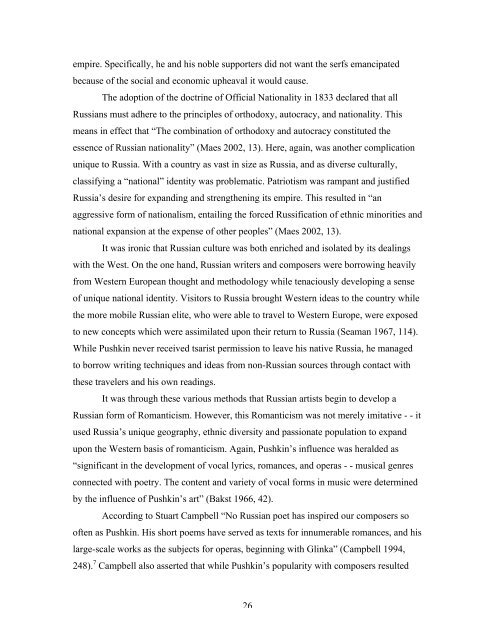Alexander Pushkin's Influence on Russian Ballet
Alexander Pushkin's Influence on Russian Ballet
Alexander Pushkin's Influence on Russian Ballet
You also want an ePaper? Increase the reach of your titles
YUMPU automatically turns print PDFs into web optimized ePapers that Google loves.
empire. Specifically, he and his noble supporters did not want the serfs emancipated<br />
because of the social and ec<strong>on</strong>omic upheaval it would cause.<br />
The adopti<strong>on</strong> of the doctrine of Official Nati<strong>on</strong>ality in 1833 declared that all<br />
<strong>Russian</strong>s must adhere to the principles of orthodoxy, autocracy, and nati<strong>on</strong>ality. This<br />
means in effect that “The combinati<strong>on</strong> of orthodoxy and autocracy c<strong>on</strong>stituted the<br />
essence of <strong>Russian</strong> nati<strong>on</strong>ality” (Maes 2002, 13). Here, again, was another complicati<strong>on</strong><br />
unique to Russia. With a country as vast in size as Russia, and as diverse culturally,<br />
classifying a “nati<strong>on</strong>al” identity was problematic. Patriotism was rampant and justified<br />
Russia’s desire for expanding and strengthening its empire. This resulted in “an<br />
aggressive form of nati<strong>on</strong>alism, entailing the forced Russificati<strong>on</strong> of ethnic minorities and<br />
nati<strong>on</strong>al expansi<strong>on</strong> at the expense of other peoples” (Maes 2002, 13).<br />
It was ir<strong>on</strong>ic that <strong>Russian</strong> culture was both enriched and isolated by its dealings<br />
with the West. On the <strong>on</strong>e hand, <strong>Russian</strong> writers and composers were borrowing heavily<br />
from Western European thought and methodology while tenaciously developing a sense<br />
of unique nati<strong>on</strong>al identity. Visitors to Russia brought Western ideas to the country while<br />
the more mobile <strong>Russian</strong> elite, who were able to travel to Western Europe, were exposed<br />
to new c<strong>on</strong>cepts which were assimilated up<strong>on</strong> their return to Russia (Seaman 1967, 114).<br />
While Pushkin never received tsarist permissi<strong>on</strong> to leave his native Russia, he managed<br />
to borrow writing techniques and ideas from n<strong>on</strong>-<strong>Russian</strong> sources through c<strong>on</strong>tact with<br />
these travelers and his own readings.<br />
It was through these various methods that <strong>Russian</strong> artists begin to develop a<br />
<strong>Russian</strong> form of Romanticism. However, this Romanticism was not merely imitative - - it<br />
used Russia’s unique geography, ethnic diversity and passi<strong>on</strong>ate populati<strong>on</strong> to expand<br />
up<strong>on</strong> the Western basis of romanticism. Again, Pushkin’s influence was heralded as<br />
“significant in the development of vocal lyrics, romances, and operas - - musical genres<br />
c<strong>on</strong>nected with poetry. The c<strong>on</strong>tent and variety of vocal forms in music were determined<br />
by the influence of Pushkin’s art” (Bakst 1966, 42).<br />
According to Stuart Campbell “No <strong>Russian</strong> poet has inspired our composers so<br />
often as Pushkin. His short poems have served as texts for innumerable romances, and his<br />
large-scale works as the subjects for operas, beginning with Glinka” (Campbell 1994,<br />
248). 7 Campbell also asserted that while Pushkin’s popularity with composers resulted<br />
26

















